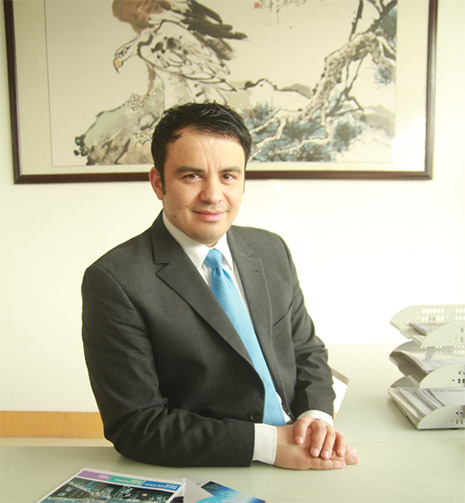

Best-Practice Interview
The Diehl Group is a global technology company that unites more than 40 organizational units. Hydrometer Metering, founded in 2004, is a leading manufacturer of meters and a successful subsidiary of the group. The Global Success Club interviewed Ender Erat, CEO of Hydrometer Metering in China, to find out more about the legal and economic framework for business operations as well as about the criteria for a successful market entry in China.

GSC: The DIEHL Group is a family business founded in 1902. Today, they are present in 20 countries on 4 continents. What do you think are the key factors for such a successful development?
Ender Erat: In the past 110 years, DIEHL has developed from an art foundry to a global technology enterprise that is operating through five divisions in various industries, such as defense, aerosystems, automotive, white goods and public utilities. With our approximately 14.000 employees and our annual turnover of about 3 billion EUR, we are proud to be owned by the family DIEHL. Stability, predictability and sustainability are all key words that have been crucial for our company's development. As a family owned company, DIEHL pays attention on the company's tradition and culture. Furthermore the company has been investing relentlessly (over decades) in R&D in order to gain a clear competitive advantage through technology leadership in all relevant industries.
GSC: In 2004, Hydrometer (Shandong) Metering was founded in Shandong/Jinan. Did you experience any difficulties when you entered the Chinese market? If so, which were they and how did you solve them?
Ender Erat: The company was founded as JV but in the meantime has been transformed to a Whole Foreign Owned Enterprise (WFOE). At the time of foundation, it was important to have a JV partner who had the right relations to related authorities as well as access to the relevant markets. As in many company, it is important that the investor has a long term perspective on the development of the market. As China belongs to one of the key growth markets for DIEHL and DIEHL Metering, it was clear that the shareholders were ready to fully support (especially financially) the enterprise in China in order to overcome the difficult start-up years. One of the main challenges was to develop stable and sustainable relations to our Chinese customers by gaining their trust and confidence in our products and services. Particularly in China such a start-up period might take years (for sure longer than initially assumed) because identifying the key decision makers, understanding the existing networks and relations and finally being accepted by them as a reliable partner is a complicated and time-consuming process. Therefore it is good to enter the market with a prudent approach rather than expecting too much in a short period of time.
GSC: Sustainability and responsible business operation are becoming increasingly important issues. On their website, DIEHL Metering declares that the "sustainable use of natural resources and energy" is their goal. How exactly do you put this goal into practice?
Ender Erat: Hydrometer Shandong is part of DIEHL and particularly DIEHL Metering. As such we see ourselves as a solution provider for public utilities (i.e. private and public district heating companies as well as water, gas and electricity supply companies) with energy metering products and services. Our solutions consist of hardware, software and services which are usually summarized under the umbrella of "Automatic Meter Reading", AMR. These solutions enable the utility to always have access to the metering points which exist in one city for example (this means not only on apartment level, but also throughout the whole distribution network) as the meter data is transmitted regularly through radio communication. This in turn gives the utilities the possibility to monitor their energy distribution networks, adjust the production of energy to the required actual consumption levels. In other words, we provide utilities with "smart meter data" that helps them to adjust their infrastructure in a way that they only produce as much energy, for example heat, as really needed by the community. Another benefit for the utility is to identify (in-time) any kind of leakage in the distribution network which is a key driver in the process of energy saving. Therefore by avoiding oversupply as well as helping to quickly fix leakage in the energy distribution networks, our company is with no doubt contributing to "sustainable use of natural resources and energy" as indicated also on our website.
GSC: Hydrometer is one of the worldwide market leaders in water metering. How do you manage to keep up with your competitors? Which role do innovations play for Hydrometer?
Ender Erat: Hydrometer was in fact founded 150 years ago. The founder of Hydrometer was the inventor of the Woltman water metering principle which even today is one of the leading water measuring methods. Therefore, it is not a big surprise that with such a long tradition and expertise that have been developed over 150 years, Hydrometer became a leading company worldwide in the field of water metering. In the meantime our competency is going far beyond just water metering as we have been investing every year approximately 10% of our turnover in R&D infrastructure. Today we are also very successful in the field of heat metering, as well as developing more and more our competency in gas and electricity metering. For sure our internal innovation management processes and in general our R&D activities drive our competitive advantage. We aim to be quality and technology leader which of course need high attention on innovations. By the way: In 1951 Hydrometer was bought by Werner Diehl and the headquarters of the company was moved to Ansbach, which is 30 km away from the DIEHL headquarters (Nuremberg). In 2008, Werner Diehl together with his brothers, Peter Diehl and Dr. Thomas Diehl, have decided to integrate Hydrometer into the DIEHL Group by establishing a new division called DIEHL Metering. Today Hydrometer is in the process of renaming itself with its global activities to DIEHL Metering. We are convinced that the integration into the DIEHL group has also helped us to further enhance our market position as we can now share resources, knowledge and experience with all our other DIEHL divisions. Particularly in the field of electronics development and production, we have strong competency in our group which underlines our success in offering highly reliable radio products (radio based communication of meter data with radio integrated meters which run easily for more than 10 years with the same performance as the first day on which they were installed).
GSC: Given your experience with business in China, how would you evaluate the economic and legal framework for business operations in China?
Ender Erat: As DIEHL Metering we are operating in a very politically and legally sensitive business environment. Our customers belong to the government and the decision makers are in most of the cases high-level government officers. Therefore, it is crucial for us to understand the political and legal system in China. This for sure is not an easy assignment as the related systems are highly complex and dynamic. Laws and regulations can change quickly and without any pre-notice or warning. This is always a challenge for our company. In general, however, we can observe that the government is working with high pressure on creating more transparency and increasing the execution effectiveness of their laws and regulations. As indicated also in the 12th Five Year Plan of the Chinese government, the Chinese society is guided towards increasing quality of living rather than focusing on economic growth only. Also the latest so called "8 Point Regulation" of the new Chinese government which was published in December 2012, gives high priority on compliance and related issues. The economy itself has been slowing down in the past few years. The double digit GDP growth era is over. But this is also intended by the government as described in the 12th Five Year Plan as well as fixed in the same documents in terms of GDP growth targets. The Chinese economy is undergoing a transformation from investment to consumption driven growth with focusing more on the development of the domestic market rather than too much stressing the importance of exports. Nevertheless it is expected that the country will continue to grow the next years (if not decades) with at least 5% - 7% with urbanization as the main driver of this growth (with approximately 20 Mio. Chinese moving from rural to urban areas year by year).
GSC: You have worked in different countries and have been in charge of international teams before. What was the most helpful aspect you learnt during this time with regard to your current position? Could you name any peculiarities of the Chinese work environment?
Ender Erat: The first thing I learnt in China was to be flexible. Particularly with a German background, we like to plan all steps we do. Prior to starting to act, we would spend some time to work out a plan while the Chinese will start to work on the implementation right away. Trial and error is a method which is regularly applied in China. During the process things might not go as planned, but surprisingly the result that is presented at the end often is pretty close to what was expected. Flexibility is also necessary when it comes to giving or expecting clear commitments. Usually Chinese like to keep all options open rather than binding themselves. Pushing someone for a commitment could even become counterproductive. Another thing which one will quickly learn in China is that it is more important to spend time on a good relation with the people rather than focusing too much on the issue. One should not be surprised that during a business dinner no one is really talking about the facts and figures anymore but rather focusing on developing good personal relations with each other. Having a "good feeling" with someone is very important for doing business in China. And a "good feeling" cannot be created in a meeting room. Therefore, Chinese like to have extended lunch and dinner opportunities which they consider as an important moment to build up the relationship. It is important to strictly follow the "eating times" which usually is 12 pm for lunch and 6 pm for dinner. In many situations it is better to continue a meeting on the next day and give the dinner a higher priority instead.
GSC: Are there any specific characteristics that need to be considered in order to successfully operate in your branch?
Ender Erat: It's very simple: Listen to your customer, treat them well and make sure they are satisfied with what they get. As DIEHL Metering we keep our promise to our customers by delivering high quality products and providing excellent service to them. Particularly after sales service is an important success driver in our industry. As in many industries in China relationship management is crucial for our success. In other words, it is very important for us that we know the right people at the right place and at the right time.
GSC: Thank you very much for this interesting interview, Mr. Erat.
More information: www.diehl.com
